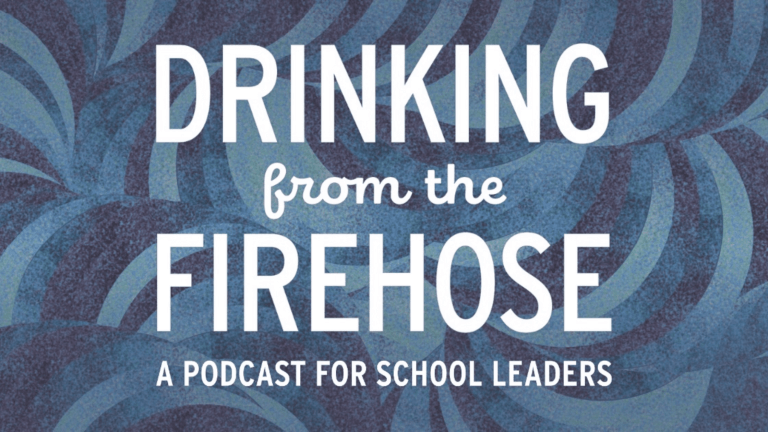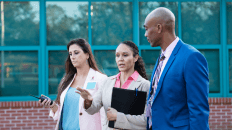In episodes 3 and 4 of Drinking from the Firehose, Mera Dougherty, a central Texas principal, delves into culturally responsive schools, shedding light on ways to celebrate and affirm students and staff. She also provides insights into fostering community engagement and explores essential aspects like diversifying the leadership pipeline, practicing cultural responsiveness in discipline and behavior, and establishing foundational elements for crafting a culturally affirming school.
Audio Transcript
Download the full audio transcript for Episode 3 and Episode 4.
Ellen Willoughby:
Welcome to Drinking from the Firehose, a podcast for campus leaders. I’m your host, Ellen Willoughby, from Education Service Center Region 13 in Austin, Texas. On today’s podcast, our topic is culturally responsive schools. I am thrilled to introduce our guest today. Hi Mera, welcome to the podcast.
Mera Dougherty:
Hi Ellen. Thanks for having me.
Ellen Willoughby:
Absolutely. Mera Dougherty started college on the path to becoming a neuroscientist, but after volunteering with local high schoolers, many of whom hadn’t received the academic preparation needed to fill out their college applications, much less succeed in higher education, she decided to pursue teaching. After working in local schools in Brooklyn, New York, and Austin as a teacher and a principal, Mera is now the founding principal of Compass Rose Destiny, a new K through 12 charter school that will be opening up in the Austin area in fall 2021.
Ellen Willoughby:
I have also had the great honor of working with Mera in the past, and I know she has a relentless passion and desire to create culturally responsive schools for all children. So I want to start off by having you share your definition of a culturally responsive school and why that is important to you.
Mera Dougherty:
Yeah. I think when we think about culturally responsive schools, we all go back to the 90’s definition, the Ladson-Billings; culturally responsive is you’re taking account of what kids’ culture is, and you’re incorporating that in some way into our pedagogy. I think now we’ve got to move on. That’s great. I’m not against that definition, but I think it’s time that we elaborate on it a little bit.
So when I think about culturally responsive schools and teaching, the thing that I think about is creating a school where an adult or a kid could walk in the door and see themselves reflected in the school. In the culture of the school, in the texts they read, in the curriculum they learn about, they see a reflection of themselves. In addition, they have a window seeing into other people’s cultures. They actually have the ability to explore other cultures and learn about them in a way that makes them respectful but also active members of a diverse society.
And then I think there’s a step that we forget, which is creating a culture that’s safe enough, where kids can actually explore their own identity, and they can be in a space where others are exploring their identities at the same time, and it’s really safe and progressive to do that. So that’s what I think about when we think about a culturally responsive school. It’s important to me. I think look at the world right now.
Ellen Willoughby:
Absolutely.
Mera Dougherty:
But I also think, because our kids are really wonderful and the culture that they have, that they inherently come in with in school, and the adults we have in our school, all come in with these cultures that are really phenomenal. They’re phenomenal humans. And we have said for so many years, “We need you to put that aside and then walk into the building.” And I think makes kids and adults not engage in education the way they could. If we said, “Actually, let’s bring that into the building, that is part of your education. Let’s really affirm that. Let’s affirm who you are, where you came from,” and give that credit, we will actually see the face of education change.
Ellen Willoughby:
Yeah. And I think that one of the big pieces that you pointed out that is really so valuable is we have for so long, like you said, shut it down, leave that at the door. We all celebrate it at these particular times of the year, based on a calendar somebody created, and that’s it. And what has been really the downfall of this? How has that shown up in our schools when we have ignored the different cultures, the different races, and the diversity of our students and our teachers?
Mera Dougherty:
Yeah. I think you’re totally right, Ellen. When we ignore this, what we’re asking kids to do is to engage in learning that has nothing to do with them…
Download the full transcripts: Episode 3 and Episode 4.
Ellen Willoughby is a Project Coordinator for Educator Evaluation and Leadership here at Region 13.





Add comment